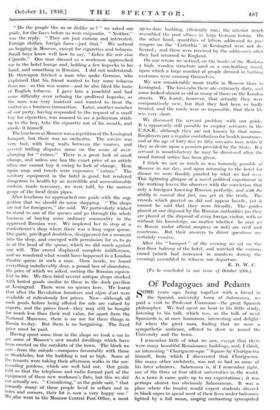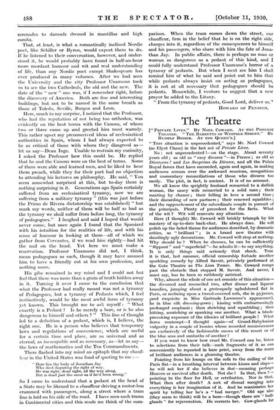Of Pedagogues and Pedants
SOME years ago, being together with a friend in the Spanish university town of Salamanca, we paid a visit to Professor Unamuno—the great Spanish philosopher. We had spent an hour in his little study, listening to , his talk, which was, as the talk of mast Spaniards is, at once humorous, interesting and delight- ful when the great man, finding that we were a sympathetic audience, offered to show us round the University and the town.
I remember little of what we saw, except that there were many beautiful Renaissance buildings, and, I think, an interesting" Churigucrresque " Square by Churigucrra himself, from which I discovered that Churiguerra, like many other architects, was not so bad as sonic of his later admirers. Salamanca is, if I remember right, one of the three or four oldest universities in the world. As a town it came quite up to my expectations ; it was perhaps almost • too obviously Salamancan. It was a place-where the tourist would expect students dressed in black-capes to spend most of their lives under balconies lighted by a full moon, singing enchanting syncopated serenades to damsels dressed in mantillas and high combs.
That, at least, is what a romantically inclined Nordic poet, like Schiller or Byron, would expect them to do. If he listened to their conversation, however, and under- stood it, he would probably have found in half-an-hour more mordant humour and wit and real understanding of life, than any Nordic poet except Shakespeare has ever produced in many volumes. After we had seen the University and the city Professor Unarnuno took us to see the two Cathedrals, the old and the new. The date of the " new " one was, if I remember right, before the discovery of America. Both are fine and interesting buildings, but not to be named in the same breath as those of Toledo, Seville, Burgos and Leon.
Here, much to my surprise, I noticed that the Professor, who had the reputation of not being too orthodox, was evidently on the best terms with the Canons, of whom two or three came up and greeted him most warmly. This rather upset my preconceived ideas of ecclesiastical authorities in Spain, whom I had always expected to be as critical of those with whom they disagreed as— let us say—Dean Inge. Unable to restrain my curiosity, I asked the Professor how this could be. Ile replied that he and the Canons were on the best of terms. Some of them were able and learned men, and he liked to hear them preach, while they for their part had no objection to attending his lectures on philosophy. He said, "You seem somewhat surprised at this, but to-day there is nothing surprising in it. Generations ago Spain certainly suffered from an ecclesiastical tyranny, now we are suffering from a military tyranny" (this was just before the Primo de Rivera dictatorship was established) "but mark my words, neither of them will be half as bad as the tyranny we shall suffer from before long, the tyranny of pedagogues." I laughed and said I hoped that would never come, but once again I found that the Spaniard with his intuition for the realities of life, and with his sense of humour in looking at them—all of which we gather from Cervantes, if we read him rightly—had hit the nail on the head. Yet here we must make a reservation. Professor Unamtmo did not, I think, mean pedagogues as such, though it may have amused him to have a friendly cut at his own profession, and nothing more.
His gibe remained in my mind and I could not but feel that there was more than a grain of truth hidden away in it. Turning it over I came to the conclusion that what the Professor had really meant was not a tyranny of Pedagogues, but a tyranny of Pedants which, I feel instinctively, would be the most awful form of tyranny yet known. This brought me to ask myself : "What exactly is a Pedant ? Is he merely a bore, or is he also dangerous to himself and others ? " This line of thought led to a definition of a pedant, which is, I believe, the right one. He is a person who believes that temporary laws and regulations of convenience, which are useful for a certain time and place, are as universal and as eternal, as inescapable and as necessary, as—let us say— the laws of mathematics and the Ten Commandments.
There flashed into my mind an epitaph that my chauf- feur in the United States was fond of quoting to me :—
"Here lies the body of Jonathan Jay
Who died disputing the right of way. He was right, dead right, all the way along. But is dead just the same as if he'd been wrong."
So I came to understand that a pedant at the head of a State may be likened to a chauffeur driving a motor-bus crammed with passengers, along a street where a tram line is laid on his side of the road, I have seen such trains in Continental cities and this made me think of the com- parison. When the tram comes down the street, our chauffeur, firm in the belief that he is on the right side, charges into it, regardless of the consequences to himself and his passengers, who share with him the fate of Jona. than Jay. In public affairs, there is perhaps no man or Woman SO dangerous as a pedant of this kind, and I could fully understand Professor Unamuno's horror of a tyranny of pedants. But when I next see him I shall remind him of what he said and point out to him that while pedants always insist on acting as pedagogues, it is not at all necessary that pedagogues should be pedants. Meanwhile, I venture to suggest that a new prayer be added to the Litany.
"From the tyranny of pedants, Good Lord, deliver 11S."
HOWARD OF PENRITIL









































 Previous page
Previous page